#ill funk ensemble
Explore tagged Tumblr posts
Text
Dad Fest Albany Washington Park 2024
on Father's Day
Lucid Street, Ill Funk Ensemble, Crazy Train, The Janis Joplin Experience were the acts.
1 note
·
View note
Text
Glowing Review for Album, SHARDS
I received an amazing review of my latest album SHARDS in Fanfare Magazine! Here are some of my favorite bits:
"Her music positively buzzes with energy…There is no doubting that Sarah Wallin Huff has a distinctive voice that is well worth hearing, and she is well served by a set of fine interpreters."
"There is no doubt that DodecaFunky is a great title…The “funk” element is rhythmically garlanded, so there is the impression of a level of extra complexity. The piano break around three minutes in is guaranteed to raise a smile, being compositionally cheeky and offering pianist Yuko Hagino the chance to shine (as she does). Brady is a fine flutist, a true mistress of her instrument, not least in the multiphonic moment. Wallin Huff’s sense of lightness is the mark of a versatile composer. This piece represents a nexus between hard bop, swing, and dodecaphony."
"The ensemble piece Of Roses and Lilies reveals another aspect of Wallin Huff’s output, full of repose and glowing timbral and harmonic beauty. The music is sometimes unashamedly expansive, post-Romantic and even filmic, and brilliantly written for solo soprano…and a six-member women’s chorus. It is only later that this is colored with more extended harmonies and somewhat clashing lines."
"A “Gothic Suite” based on poems by Edgar Allen Poe, Nevermore was composed for violist Charlotte Goode between 2019 and 2021. The first movement is “Raven”: A man pines for his lost lover, Lenore; a raven arrives and says the one word, “Nevermore,” mocking the narrator’s sorrow. The viola line is both long-breathed and longing; some gestures from Liszt’s dark side permeate the piano. The dedicatee is also the performer here, and Goode and Hagino work perfectly together. There is a real sense of illness to “Annabel Lee”… Goode’s tuning is perfect, her phrasing eloquent and heartfelt."
"The final piece [The Dark Glass Sinfonia] dates from 2017. I imagine Forteian pitch-class set analysis might have a field day here: the piece is hexachordally based, but blends free atonality with nodal harmonies in an attempt to represent the eternal flux of the Soul. This short work of less than eight minutes is fascinating in its harmonies: They seem pregnant with meaning and potential. The Janáček Philharmonic Orchestra Ostrava is in top form, with some particularly impressive trumpet solos. For all its background theory, there are moments of real harmonic warmth. The piece is subtitled “We See Through a Glass Darkly,” and until about five minutes in it keeps to the mood of the title; then an Ivesian riot ensues (slightly toned down from those of the Master). It certainly sounds like the Ostravans have fun here, as the performance takes on an energy akin to live performance. It has a rather filmic climax. This is a well-composed piece that traverses a wide terrain over its brief duration."
Read more detail at the link below!
And, if you haven't already, be sure to save this album on your favorite platform! :)
#contemporary classical works#album review#women composers#neurodivergent composers#chamber music#symphony orchestra
3 notes
·
View notes
Text
I've started very, very slowly putting information together for my new about pages (Hana and every side muse - except the non-canon Vh'thra personification - will have one) and I finished Ren's bio and I think I'm happy with it which means everyone has to look.
Trigger warnings for self-harm and suicide.
Ren Ishikawa was born in Japan on 26 March 199x to loving parents who, after so many years of trying and hoping and praying - years of pain and loss and trying again - had finally brought a beautiful baby boy into this world, who loved him and wished only to give him the best in life.
As the years went by, Ren was loved by his parents and felt just as loved, willing to give as much back as the child could.
Growing up was rather unremarkable for Ren, not to say that it was at all a bad thing; he had loving parents, enough friends so he never felt too lonely and his grades in school were slightly above average, though excelled in the artistic subjects. He was never bullied and people typically had nothing but nice things to say about him.
It was first suggested that Ren pick up an instrument at the age of eight, and he was immediately drawn to the electric bass. An instrument that’s easy to learn and hard to master (made more difficult with his small hands when first picking up the instrument, but something which would get easier with time), as the years by ren found himself improving and branching into other instruments, including electric guitar and keyboard, and joining his high school’s music club and jazz ensemble, both Ren and his skills beloved by all like-minded creatives.
He was having so much fun and the time of his life until he simply wasn’t.
One day Ren, age 16, just found it more difficult to practice any of the instruments he’d been playing for years. Neither they nor the ensembles he was a part of brought him the same kind of excitement they once had, and such a realisation made him feel worse until it began festering in his mind. He found little point in getting up and had to be forced to do so much as get up for school in the morning. His attendance and grades dropped as weeks and months went by, and the thoughts got darker and darker.
This change in behaviour, of course, did not go unnoticed by his parents. They tried to talk to him and ask if anything was wrong, but they were always met with Ren insisting he was fine and just wanted to be left alone.
Behind the facade was a much different story.
Ren had started cutting in a futile attempt to hide his emotional pain behind physical pain, though the act simply made him feel ashamed later, and thus got caught in this cycle of self-harm. Feeling only worse and worse, he began withdrawing almost entirely, to the point where his mother had to come into his room and beg him to join her and his father for dinner.
It was one of those nights during this new routine that his mother will never forget, and which Ren will always feel ashamed for having caused his mother to experience.
His mother was making her way to his room in an attempt to have Ren join them for dinner, as she now did every night. With no response she entered anyway, only to find her beloved son on the floor, bleeding out with a large slice across his neck, the offending weapon only inches from his hand.
He was lucky, in the doctor’s words, to survive the ordeal.
Ren was diagnosed with major depressive disorder by the mental health professional while recovering in hospital, and since that day he has been taking medication for his mental illness and regularly sees a psychologist, though the results are mixed.
It was in the days and weeks after this attempt, still recovering from his attempt (and, admittedly, too ashamed to go to school with stitches on display), that he discovered future funk, a genre the fusion of electronic music (of which Ren was already a fan) and genres such as funk and city pop. He immediately fell in love and, although it was no cure for his newfound depression, renewed his outlook (however slightly) and saw his passions for music come back.
Since that day, Ren had started learning about producing his own music and began investing in equipment for his own makeshift “home studio” (which is difficult when you’re a jobless teen living at home) and began attempting to create his own music.
Though his earlier attempts at creating music could be described as cute, Ren has made leaps and bounds since then. Online he goes by the moniker second encore, a name often associated with the genre of future funk. Though he is a far way from being able to make a living on his music alone (working a day job as a barista at a local cafe), Ren often plays at clubs and events; playing in front of an energetic crowd makes him forget all his inner turmoil if only for a few hours, filling him with vigour and adrenaline.
Ren is a man of many musical interests, though finds himself drawn to that which is more upbeat and optimistic. He didn’t need to look far to find the idol Miyu, who has been played on radio stations consistently since her debut. He instantly fell in love with her J-pop tunes and began following her career; though he can’t make it to any of her concerts, he never misses an album or a single.
When he discovered the idol’s stream, the nervous Ren - under his musical moniker - dared to send through a donation, halfheartedly inviting her to collaborate some time. Of course he didn’t think anything of it; it was enough just to hear her say, “Thank you so much for the donation, second encore!” (not to mention the people who were excited to find out that second encore was a fan of Miyu), but when he received a message some days later from the very same idol saying she’d be interested in meeting up - well, ecstatic would only begin to describe how he felt.
Since their meeting, Ren and Hana have become good friends and often collaborate on Ren’s tracks together (though Hana uses the alias HM02, given the work is not official for the idol). He does not dare reveal his mental turmoil to Hana (nor anyone other than his parents or psychologist) out of fear of being ridiculed or otherwise viewed differently, and though her presence is certainly not a cure for his depression, Ren finds himself feeling a little less disenchanted with the world when she’s around.
#gonna be a while until these pages are officially published so might as well post this here <3#i might put up ayane's too - MIGHT - but any other new characters will be under wraps hehehe <3#(i'm doing hana's doc later since i already do have info up for her)#future funkin' ・゚✫ side muse (ren ishikawa)
3 notes
·
View notes
Text
10 Essential Songs by Sinead O’Connor
Her catalog is full of raw passion and raw nerve.
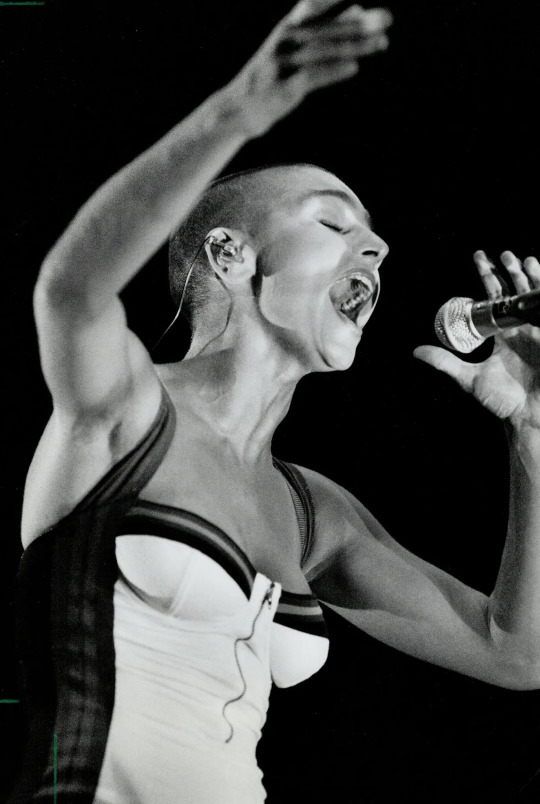
By Jon Pareles
July 26, 2023, 9:08 p.m. ET
Sinead O’Connor did not hold back. Not her voice, not her ideas, not her troubles, not her rage, not her sorrows, not her faith. From the moment her debut album, “The Lion and the Cobra,” appeared in 1987, O’Connor — whose death was announced on Wednesday — flaunted raw passion and raw nerve.
She seemed equally startling, at first, for her keening voice and her shaven head. Her singing encompassed cathartic extremes: lullabies and imprecations, sighs and howls. She made bold, intemperate public statements, like famously tearing up a photograph of the pope on “Saturday Night Live” in 1992. Yet her songs also offered comfort, nurturing and righteousness; she was an idealist, not a provocateur. And she struggled openly: with the music business, with unforgiving journalists, with career pressures and with mental illness.
O’Connor was emphatically Irish. The inflections of old Celtic music sharpened her voice, and she was shaped by her Catholic upbringing, if only to later reject it. Yet she was anything but provincial. She produced her own debut album when she was only 20, drawing already on punk, dance music, electronics and seething orchestral arrangements. She would go on to work with reggae, big-band music and more; her voice, even at its gentlest, could leap out.
O’Connor’s first two albums were her most inspired ones. They were charged with youthful turbulence and unbridled ambition, as O’Connor sang about love, death, power and making her own place in the world. She went through some fallow patches afterward, but she never stopped striving to sing her own truth.
‘Mandinka’ (1987)
With a distorted, three-chord rock stomp, O’Connor brashly announces, “I don’t know no shame/I feel no pain,” landing hard on dissonant notes. The song seesaws between refusal and acceptance, with a final tease of “Soon I can give you my heart.” But O’Connor also flexes her high notes in nonsense syllables that are as defiant as any word she sings.
‘Troy’ (1987)
One side of a lover’s quarrel unfurls across an operatic six and a half minutes, backed by a string ensemble that underlines every churning emotion: memories, accusations, confessions, vows, pleas, warnings and the sheer desperation when O’Connor sings, “Does she hold you like I do?” followed by a howl of pain.
‘I Want Your (Hands on Me)’ (1987)
Chattering, percussive funk carries this call for physical pleasure, and as she bounces her voice against the syncopated beat, O’Connor summons unabashed rasps and moans.
‘Nothing Compares 2 U’ (1990)
O’Connor’s commercial peak — a No. 1 pop single — thoroughly commandeered a song Prince wrote for a 1985 album by the Family. She makes her voice small and bereft, then lashes out at consolations; she places Celtic turns at the ends of phrases. And she brings crucial changes to Prince’s melody, making upward leaps when the chorus gets to the line “Nothing compares to you.” Its video clip — almost entirely a close-up of O’Connor’s face against a black background — forged an indelible image of loneliness.
‘I Am Stretched on Your Grave’ (1990)
A hip-hop beat backs an old Irish poem that was translated into English and turned into a song. Its narrator mourns the death of his lover, wishing to join her. O’Connor’s voice, completely exposed over the stark rhythm track, is otherworldly. A fiddle arrives near the end, completing the mesh of traditional and contemporary.
‘The Last Day of Our Acquaintance’ (1990)
The formal mechanics of a divorce — “I will meet you later in somebody’s office” — can’t contain the bitterness of the situation. For most of the song, O’Connor sings over two calmly strummed acoustic guitar chords, but agitation rises in her voice, and when a band eventually kicks in behind her there’s no mistaking her fury.
‘You Made Me the Thief of Your Heart’ (1994)
This incantatory rocker was written by Bono, Gavin Friday and Maurice Seezer for the film “In the Name of the Father.” If it sounds like O’Connor fronting 1990s U2 — with a pealing piano and an implacable beat — it draws the best from both, with U2’s echoey depths, O’Connor’s primal peaks and the high-stakes dynamics they both thrived on.
‘This Is to Mother You’ (1997)
O’Connor promises to “do what your own mother didn’t do” in a song that radiates kindliness and womanly strength. It’s a folky, Celtic-tinged lullaby that promises to end a dark back story, to release someone — perhaps a lover, as the video suggests — from “All the pain that you have known/All the violence in your soul.” It’s pure unselfish comfort.
‘Jealous’ (2000)
“I don’t deserve to be lonely just ’cause you say I do,” O’Connor insists in “Jealous,” a not-quite-breakup ballad she wrote with Dave Stewart of Eurythmics. The beat is measured. But the singer’s partner is keeping her dangling, and she’s not sure what she wants either; she makes her harshest judgments in her most fragile voice.
‘Dense Water Deeper Down’ (2014)
The folk-rock jubilation of “Dense Water Deeper Down” — with muscular guitar strumming, layered harmonies, even some happy horns — celebrates a lover who “makes me forget everything my mother warned.” There’s just one catch: He’s only a memory.
Jon Pareles has been The Times’s chief pop music critic since 1988. A musician, he has played in rock bands, jazz groups and classical ensembles. He majored in music at Yale University. More about Jon Pareles
#Sinéad Marie Bernadette O'Connor#Shuhada' Sadaqat#Magda Davitt#Sinéad O'Connor#The New York Times#Essential Songs#Jon Pareles#Spotify
3 notes
·
View notes
Text
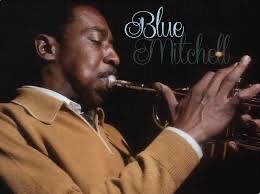
Richard Allen “Blue” Mitchell (March 13, 1930 – May 21, 1979) was a jazz, rhythm and blues, soul, rock, and funk trumpeter, and composer who recorded many albums as leader and sideman for Riverside, Blue Note, and Mainstream Records.
After high school, he played in the rhythm and blues ensembles of Paul Williams, Earl Bostic, and Chuck Willis. After returning to Miami he was noticed by Cannonball Adderley, with whom he recorded for Riverside Records in NY in 1958.
He then joined the Horace Silver Quintet, playing with tenor saxophonist Junior Cook, bassist Gene Taylor, and drummer Roy Brooks. He stayed with Silver’s group until the band’s break-up in 1964, after which he formed a group with members from the Silver quintet, substituting the young pianist Chick Corea for Silver and replacing Brooks, who had fallen ill, with drummer Al Foster. This group produced several records for Blue Note. It disbanded in 1969, and he joined and toured with Ray Charles until 1971.
He performed with John Mayall, appearing on Jazz Blues Fusion and subsequent albums. He recorded and worked as a session man in the genres noted, performed with the big band leaders Louie Bellson, Bill Holman, and Bill Berry, and was the principal soloist for Tony Bennett and Lena Horne. Other bandleaders Mitchell recorded with include Lou Donaldson, Grant Green, Philly Joe Jones, Jackie McLean, Hank Mobley, Johnny Griffin, Al Cohn, Dexter Gordon, and Jimmy Smith. #africanhistory365 #africanexcellence
0 notes
Link
Debbie Harry doesn’t believe in harbouring regrets. “I have made many, many errors, but nobody leads a perfect life,” she reflects down the telephone from New York. “So, should I regret anything? No. It is a waste of time. It really is a waste of time.”
Dial back to the turn of the 70s and the life that Harry led before fronting Blondie – prior to her image being burned onto the retina of popular culture – was colourful to say the least. “I was so desperate to live life,” she says of her time spent hanging with the outcasts and artists of downtown New York. “I was jamming in as much experience as I possibly could and I don’t know if I could have done anything differently. I learned a lot.”
The old Bowery music venue CBGBs has long passed into music folklore as the place that called the likes of Television, Patti Smith, and the Ramones their house bands. It was also where punk and new wave progenitors Blondie cut their teeth before they sashayed into the wider world with the protean panache that would make them a household name. Classic singles such as “Heart of Glass”, “Call Me”, “Atomic”, and “Rapture” have been responsible for more worldwide rug-cutting than an industrial carpet tool. To imply that they were merely a solid singles band is to do them a cardinal disservice, however.
And although they’ve always cocked their attention to the things ahead of them, Harry and her Blondie cohorts have spent a lot of time looking back just lately. Harry’s long-awaited autobiography, Face It, hit the shelves last year, and Blondie co-founder and one-time partner Chris Stein published Point of View: Me, New York City, and the Punk Scene, a photography book featuring personal snaps taken during the band’s pomp in the 70s and early 80s. “We can’t keep on touring and doing club dates the way that we used to. It would be physically impossible,” Harry concedes. “Living through this pandemic has certainly made us take a long look at the value of what we’ve got with our body of work.” Asked if it is a process of attempting to frame their legacy, she admits it’s something that they “have to do”.
This deep-dive into their canon has culminated in a mouth-watering archive set, Blondie: Against the Odds 1974-1982, slated for release next year. Coming in four formats, it promises to include extensive liner notes, “track by track” commentary by the entire band, a photographic history plus rare and unreleased bonus material. The group will also go out on the road – coronavirus permitting – for an autumn Against the Odds UK tour with Garbage.
The artist born Angela Trimble was put up for adoption only a few months after she was ushered into the world in the summer of 1945. A loving New Jersey couple took her in, rechristened her Deborah Harry, and raised her as their own. She grew up in a suburb that she “never left”, was voted best-looking girl in her high school yearbook, and oscillated within a social circle that consisted of “many of the same people” throughout her childhood. “I was somehow shy within that,” she recalls, “(but) somebody once said to me that being shy was an ego trip and a light went on in my head. I thought, ‘Oh, uh-huh, let’s have none of that!’”
Harry travelled by bus as a curious teen to nearby Greenwich Village, imbibing the febrile inner-city atmosphere. In 1965, she graduated from junior college with an associate of arts degree and New York’s allure became too enticing to resist. She decamped to the bright lights of the city and made ends meet with a succession of odd jobs, including secretarial work for the BBC, waiting tables and an infamous nine-month stint as a Playboy Bunny.
The period was a traumatic one, too, with Harry enduring an ex-lover-turned-violent-stalker and a near-miss with serial killer Ted Bundy (although Bundy’s identity is contested by others). In her memoir, she writes candidly of the time she was raped by a man wielding a knife while on her way home from a concert with Stein. Music offered a vessel for her creativity, and she spent time as part of girl group The Stilettoes and folk ensemble Wind in the Willows before her meeting with guitarist Stein which set the foundations for Blondie. Their classic lineup was completed by Gary Valentine (bass), Jimmy Destri (keys), and Clem Burke (drums).
“Somebody once said to me that being shy was an ego trip and a light went on in my head. I thought, ‘Oh, uh-huh, let’s have none of that’” – Debbie Harry
Although they self-identified as punks, the parochial and nihilistic mandate as promulgated by the genre’s militant diehards never fit Blondie comfortably. The group looked outwards from the moment they started, drawing inspiration from their cosmopolitan city. Their sound was a melting pot pulling at the seams of culture’s fabric, and they would weave their own patterns from it.
Harry agrees that their eclecticism was down to good fortune in coming from the “metropolitan area of New York” where they ingested “a lot of musical influences”. Taken as a whole, their catalogue bears this out. Blondie never stood still musically – yet never sounded like anyone else – and they loaded their songs with more hooks than a fisherman’s trawler. 1976’s punchy, eponymous debut married surf-rock textures with 50s girl-group sensibilities, and their palette had expanded exponentially by the time of seminal third album, Parallel Lines (1978). Eat to the Beat and Autoamerican followed, by which point they could boast flirtations with disco, rocksteady, funk, hip hop, and more within their enviable output.
When asked to pick one track that encapsulates the essence of Blondie, Harry opts for their 1981 US number one single “Rapture”. “What happens in ‘Rapture’ is very comprehensive,” she says. “It took a form of music that was, or still is, very modern and can be very political. Rap and hip-hop songs back then didn’t have their own songs. Rappers would just rap on somebody else’s music. (‘Rapture’) was crafted specifically for that rap. Until then that hadn’t been done. It was a breath of fresh air.” It stands as one of the things in her career that she feels “very good about”.
Blessed with the sort of features that could sell sand to the Saharans, Harry’s appearance caused a stir from the band’s earliest days. “That’s part of showbiz,” she says to me, trying to downplay it. “We always had an eye for that, the entire band. We always had an idea of making a look that represented our sensibilities and links to British pop and mod.” Maybe so, but it was Harry alone who was immortalised by Andy Warhol in one of his iconic silkscreen prints, and who posed for era-defining photographers including Robert Mapplethorpe and Anne Leibowitz.
Did the disproportionate attention she attracted ruffle feathers within the Blondie camp at the time? “Yes and no,” Harry remembers. “We were all happy that it was working. I suppose there was a certain amount of competition or jealousy but ultimately, no. I think that’s a better question for Clem or one of the other members in the band. Of course my relationship with Chris was so close that he was very happy about everything.”
The band’s wheels eventually came off after their muddy and unfocused sixth album, The Hunter, dashed against the commercial rocks in 1982. They had to abandon their subsequent tour after Stein became gravely ill with a rare autoimmune disorder, pemphigus vulgaris, that proved extremely difficult to diagnose. Blondie had no option but to bow out of the public eye, and they broke up quietly.
15 years later, with Stein fully recovered, the group reconvened and released a critically acclaimed and commercially successful comeback album, No Exit. They even topped the UK charts with lead single “Maria”, but faced tussles with erstwhile members at the time too. Former bassist and co-writer on “One Way or Another”, Nigel Harrison, and guitarist Frank Infante attempted to sue the rest of the band over their omission from the reformed lineup. And when Blondie were inducted into the Rock and Roll Hall of Fame in 2006, Infante grabbed the microphone to express his ire publicly.
Fast-forward to 2020 and the settled iteration of the band are working on a new album with John Congleton, who produced 2017’s Pollinator. Does Harry have a formula when it comes to songwriting these days? No, as it happens. “When a phrase or a sentiment makes me respond emotionally or physically, I write it down and I save it,” she explains. “At a certain point, I’ll sort of review things. A lot of times I like to just work with a rhythm track. Just a drumbeat or some kind of drone-y rhythm, a groove. Other times people will give me a rough sketch of some chord changes – an idea that they’ve got. I seem to work in a lot of different ways.”
Thanks to her effortless chic and timeless looks, Harry’s relationship with the fashion industry has been a mutual love-in since forever, and she recently announced a revival of her partnership with ethical fashion designers Vin + Omi – the duo responsible for her profane ‘STOP FUCKING THE PLANET’ cape worn at the Q Awards in 2016 and throughout Blondie’s Pollinator tour. They have teamed up for a new sustainable clothing line entitled HOPE, and her enthusiasm for the project is palpable. “I love Vin + Omi,” she says. “They are so creative and adventurous. They have this desire to prevail and do things that are smart and modern in terms of recycling and making energy count. I think that is brilliant.”
As a fledgling bee-keeper, the plight of the bees is also something close to Harry’s heart. It was one of the reasons why 2017’s Pollinator was, well, named exactly that. “You’re either being stung by a bee or you’re going to eat its honey,” she chuckles softly, marvelling at the absurdity of the contrast. “But bees and water are two issues we cannot escape from. We should be concerned with finding better ways of living, using our resources in the best way possible.”
Help is coming, she hopes, through the election of Joe Biden, who is “firmly attached” to the idea of helping the environmental cause – and she believes his ideas can help the economy, too. “I’ve been saying for quite a long time that solar and wind power are renewable (energies) that can create jobs,” she says. It’s a far cry from her feelings towards outgoing President Trump and his “daily infusion of bullshit” and “thunderstorm of endless diatribes”.
“One of the most exciting things about rock’n’roll was that it was about breaking the rules, and (‘WAP”) is certainly a part of that. It’s titillating and aggressive and it is part of what is exciting about popular music. The nature of what we try to do is to shock and entertain at the same time” – Debbie Harry
What strikes you when you speak to Harry for an extended period is not only her warmth, but her unexpected humility for someone so staggeringly famous. I reference a Bob Dylan BBC interview from the 80s in which he observed with sadness how his fame had the ability to change a room’s energy and how he missed seeing people act naturally around him. She paws the comparison away, saying she’s nowhere near famous “to the degree of Bob Dylan”, whom she calls “such a megastar”. This could sound like false modesty coming second-hand, but in person it feels like a sincere statement, even if it is a little bewildering coming from an international icon. She will concede, however, that she has “definitely noticed and felt something like that” and has often wished she could simply be “a fly on the wall”.
There is also an inquisitiveness that makes the conversation a more two-way affair than your quote-unquote typical ‘interview’. She fires questions back at you, not as a deflection tactic, but to expand and explore a topic further. This happens when conversation turns to Cardi B and Megan Thee Stallion’s ubiquitous “WAP”. A recent interview had her fangirling over the track, but Harry’s feelings no longer appear to be as clear-cut and she wishes to discuss the song further. “I love it and hate it at the same time,” she now shares. “One of the most exciting things about rock’n’roll was that it was about breaking the rules, and (‘WAP’) is certainly a part of that. It’s titillating and aggressive and it is part of what is exciting about popular music. The nature of what we try to do is to shock and entertain at the same time.” She pauses. “I don’t know. Everything is revealed and maybe sexual explicitness has come of age.”
Pushed about what she dislikes about “WAP”, she says she would “hate it” if any young girl or woman was hurt by the song’s message. “I think that, in a way, men have to know that women think like this, and that there is this component,” she says, “but I would hate it to mean that everyone should be treated like this. I don’t think anybody should be hurt by sex”.
Harry has long championed the LGBTQ+ communities. When she refers to her dearly departed friend and Hairspray co-star Divine as a ‘drag queen’ in Face It, she acknowledges the term in some instances is no longer accurate or politically correct. I suggest that it can often seem as though the evolution of our language is speeding up in the digital age – by necessity, of course – and ask her if online culture fills her with concern when it comes to using the right terms. “Yeah, (because) in many cases it can be a slip of the tongue, especially for an old dog like me! Things do move so very, very quickly. It is hard to keep up,” she observes. “Fortunately, I have a lot of godchildren!”
Speaking of younger generations, Harry likes to think she’d have coped with social media if she were coming up today, but is thankful that she had her “dark cocoon” in which to “bloom out of”, a place where she was able to “ripen”. “When you’re under the harsh glare of constantly being analysed, that shapes you whether you want it to or not,” she says. “It’s a germ or a seed that’s planted in your mind. It can take surprising turns and it can affect your growth. For good or for worse, who knows?”
“When you’re under the harsh glare of constantly being analysed, that shapes you whether you want it to or not. It’s a germ or a seed that’s planted in your mind. It can take surprising turns and it can affect your growth” – Debbie Harry
One thing that remains is her fierce level of self-criticism. “I always want to do better,” she declares matter-of-factly. “I’ve always been very critical of everything. I hear things or look at them and say, ‘Oh God, it should have been that (instead).” Maybe this hypercritical inclination is what still drives her forward. “I honestly don’t like resting on my laurels. I like working and I like creating. I always beat myself up about not being more creative or more prolific.”
When looking at the bounty of projects she has lined up, no one in their right mind could put Debbie Harry and laurel-resting in the same sentence. Aside from the new album, archival set and fashion project, the paperback edition of her autobiography will be released with a brand-new epilogue in April of next year. (Just don’t ask her what’s in it – “I don’t remember what I wrote. I’ll have to look it up!” she says with a laugh.)
The signs are that the musician is done looking into the rear-view mirror, though. Time may be passing, the tide may be higher, but Debbie Harry is doing more than merely holding on. Her eyes are locked to the future and she’s positively thriving.
Blondie: Against the Odds 1974-1982 will be released next year; Face It is out now via Harper Collins
8 notes
·
View notes
Photo

please Welcome to the Festival that don’t take place in a location that disappeared, this is the idea of the bookers of the Ghost Festival in Switzerland, involved are around 300 Swiss bands that mainly make a living from their music (Switzerland is expensive country, the bands they mostly poor), the problem is that most of them are their own Boss of their own company and cant get any money support from the government .. so are the bookers (the sound guys and stage etc they are not included in that project) anyway its a great idea.. it shows there is nothing going on .. please don’t let that infrastructure Die what we build up for such a long time .. culture grows, you can’t click it on or off.. https://www.ghost-festival.ch/index.php
the Line up.. alphabetically :) hahahah insane....
11Ä 7 DOLLAR TAXI 77 BOMBAY STREET ABU ACID AMAZONIANS ADRIAN STERN AL PRIDE ALENKO ALICE ALINA AMURI ALOIS AMAMI ANIMADIVAS ANIMOR ANNA AARON ANNA ROSSINELLI ANNIE TAYLOR ARISTIDE ARTHUR HENRY ARTURO Y SU AZUCARIBE ASBEST AUDIODOPE BASCHI BAZE & SQUISHY BOYZ BIANDAPID BIBI VAPLAN BIG ZIS / BIGENERIC BILLIE BIRD BLACK SEA DAHU BLACKTIGER BLIND BUTCHER BONAPARTE BOYS ON PILLS BRANDY BUTLER BUBI EIFACH BUDS / CALI P CAROLINE ALVES CAROLINE CHEVIN CARROUSEL CASANORA CÉGIU CELLO INFERNO CHAMITO CHAOSPHONIE CHAOSTRUPPE CHEIBE BALAGAN CHIARA / CHLYKLASS CHORALE COLIQUE CINNAY CLAUDE WAVE COBEE COMPANY OF MEN CONVULSIF COOKIE THE HERBALIST CRÈME SOLAIRE CRUISE SHIP MISERY CYRIL CYRIL DA CRUZ DABU FANTASTIC DACHS DAGOBERT DANA DANASE & STERNEIS DAWILL DELILAHS DEMGEN DENNERCLAN DEWOLPHE DIOSMOS DIRTY SOUND MAGNET DODO DODO HUG / DOMI CHANSORN DON‘T KILL THE BEAST DR SCHNUU & SINI TIERLI DUB SPENCER & TRANCE HILL E-L-R EAZ EFFE / EFTN EL RITSCHI ÉLECTROGÈNE ELIANA BURKI ELIAS BERTINI / ELLAS ELMO4 EMANUEL REITER ENSEMBLE BATIDA ES BRENNT - WAS TUN? ESKIMO EVA LEANDRA FAI BABA FALLAN FAMARA FIJI FREDA GOODLETT BAND FRUTTI DI MARE FUSION SQUARE GARDEN GIANT SLEEP GIGI MOTO / GIMMA GRAND MOTHERS FUNK GUSTAV & THE SHINING GIRLS FROM PHREEBÖRG HALUNKE HAMP GOES WILD HARVEY RUSHMORE & THE OCTOPUS HECHT HEIDI HAPPY HELENKA HOT LIKE SUSHI HOT RUNNING BLOOD HOWLONG WOLF IKAN HYU ILL EAGLES INEZ INSIDE THE BAXTER BUILDING IRA MAY JAËL JAMES GRUNTZ JAN OLIVER JAR / JASMIN ALBASH JEANS FOR JESUS JESSIQUOI JOE SCHWACH JOE VOLK & NAIARE JOHNNY TROUBLE JPTR JUKI P2 JULI LEE JULIAN VON FLÜE JULIE CAMPICHE QUARTET KAOS PROTOKOLL KAUFMANN / KIMBO KING PEPE & THE QUEENS KINGS ELLIOTT KLISCHÉE KNACKEBOUL KOKHLIAS И LOULAN KT GORIQUE KUMMERBUBEN KUNZ KUSH K L‘ORAGE LA NEFERA LANDRO LARALBA LAURENT C. LEECH LEGENDARY LIGHTNESS LÉLIA LORTIK LES LEGROUP LIA SELLS FISH LINA BUTTON LINX & LECHZ LISA ORIBASI LO&LEDUC LONG TALL JEFFERSON LORD KESSELI LOS VACÍOS DE CHARLY LUCA HÄNNI LUUK MAHADEV COMETO MAKALA MAKE PLAIN MAPLE TREE CIRCUS MARCO MARCHI & THE MOJO WORKER MEIMUNA MELKER M’GHADI MICH GERBER MICHAEL VON DER HEIDE MIGO&BUZZ MISS C-LINE MISTER MILANO MÖCHTEGANG MOES ANTHILL MONTE MAI MONUMENTAL MEN MURPHY / NAMAKA NATE NATIV NEWKILLAZ» NICKLESS NICOLE BERNEGGER NIRVANAZ NOAN NONE OF THEM NOT NEMO NOTI WUMIÉ O.U.M.P.H. ODD BEHOLDER OESTETIK OMNI SELASSI OPEN SEASON PABLO NOUVELLE PARADISCO PASCAL GAMBONI & REES CORAY PATENT OCHSNER PENKOSWKY PETER KERNEL PHOAM / PIER PIPPO POLLINA PUTS MARIE PVP PYRO QL RAY DRMA RAY WILKO REVEREND BEAT-MAN RIO WOLTA RITA ROOF ROLI FREI & THE SOULFUL DESERT SAITÜN SPRÜNG SAM GRUBER BAND SAPIN MAGIQUE SCHOEDO SEMORO SOUHARCE ET EFFRACTION VACANCES SEX ORGANS SHEM THOMAS SILBERBÜX SILENT TALK SINA SISMA SKICLUB TOGGENBURG SKOR / SLAM & HOWIE SLIMKA SOUKEY SPUTNIK SUSHI STAHLBERGER STEFANIE HEINZMANN STEFF LA CHEFFE STEPHAN EICHER STILLER HAS STUDEYEAH SUSPENDERS TEXTER THE CAVERS THE CRUMPETS THE FAILURES THE HIGH HORSE THE HOODOO SINNERS THE JACKETS THE MAGIC 5 THE MONOFONES THE MONSTERS THE NEXT MOVEMENT THE PEACOCKS THE PEARLBREAKERS THE SHEIKS THE SOULS THE SPARKLETTES THE YELINS TIM & PUMA MIMI TIM FREITAG TIMMERMAHN TO ATHENA TOBIAS CARSHEY TOMAZOBI TOMMY VERCETTI & DEZMOND DEZ TONGUE TIED TWIN TONI VESCOLI TOUT BLEU TRAKTORKESTAR / TRIO DE POCHE TRIO FROM HELL TROUBAS KATER TRUE TRUWVE TSCHUGGR TURBO FANTÔME URBAN JUNIOR URSINA VERA KAA VERONICA FUSARO VERONIKA’S NDIIGO VERSO SUELTO VOGULYSSENE VOLCA MASSAKER ORCHESTER WABJIE WHAT‘S WRONG WITH US? WILLIAM WHITE WOLFMAN XEN YVONNE MOORE & MAT CALLAHAN ZAREK SILBERSCHMIDT ZHZ ZÜRI WEST
4 notes
·
View notes
Text
Eazy-E
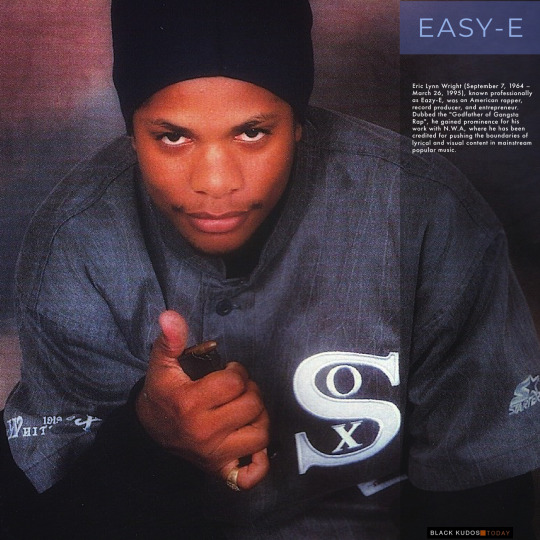
Eric Lynn Wright (September 7, 1964 – March 26, 1995), known professionally as Eazy-E, was an American rapper and rap mogul who propelled West Coast rap and gangsta rap by leading the group N.W.A and its label, Ruthless Records, pushing the boundaries of lyrical content.
Born and raised in Compton, a small yet violent city near Los Angeles, Wright had several legal troubles before founding Ruthless in 1987. After a short solo career with frequent collaboration with Ice Cube and Dr. Dre, they joined, forming N.W.A, later that year.
N.W.A's debut studio album, Straight Outta Compton, released in 1988, highly controversial then, is now ranked among the greatest and most influential albums. The group released its third and final studio album, Niggaz4Life, in 1991, and soon disbanded.
During N.W.A's splintering, largely by disputes over money, Eazy-E became embroiled in bitter rivalries with Ice Cube and Dr. Dre, who had departed for solo careers in 1989 and 1991, respectively. Resuming his sole career, Eazy-E released two EPs.
Yet Wright remained more significant behind the scenes, signing and nationally debuting the rap group Bone Thugs-N-Harmony from 1993 to 1994. But in 1995, suddenly hospitalized and diagnosed with AIDS, Wright died through its complications.
Early life and Ruthless Records investment
Eric Wright was born to Richard and Kathie Wright on September 7, 1964, in Compton, California, a Los Angeles suburb noted for high crime rates and gang culture. His father was a postal worker and his mother was a grade-school administrator. Wright dropped out of high school in the tenth grade, but later received a general equivalency diploma (GED).
Wright supported himself mainly by selling drugs, and introduced his cousin to the illicit occupation. Wright's music manager Jerry Heller recalls seeing Wright selling marijuana, but not cocaine. Heller would claim that Wright's "dope dealer" label was part of his "self-forged armor". Wright was also labeled as a "thug". Heller explains: "The hood where he grew up was a dangerous place. He was a small guy. 'Thug' was a role that was widely understood on the street; it gave you a certain level of protection in the sense that people hesitated to fuck with you. Likewise, 'dope dealer' was a role that accorded you certain privileges and respect."
In 1986, at age 22, Wright had allegedly earned as much as US$250,000 from dealing drugs. However, after his cousin was shot and killed, he decided that he could make a better living in the Los Angeles hip hop scene, which was growing rapidly in popularity. He started recording songs during the mid-1980s in his parents' garage.
The original idea for Ruthless Records came when Wright asked Heller to go into business with him. Wright suggested a half-ownership company, but it was later decided that Wright would get eighty percent of the company's income and Heller would only get twenty percent. According to Heller, he told Wright, "Every dollar comes into Ruthless, I take twenty cents. That's industry standard for a manager of my caliber. I take twenty, you take eighty percent. I am responsible for my expenses and you're responsible for yours. You own the company. I work for you." Along with Heller, Wright invested much of his money into Ruthless Records. Heller claims that he invested the first $250,000 and would eventually put up to $1,000,000 into the company.
Musical career
N.W.A and Eazy-Duz-It (1986–1991)
N.W.A's original lineup consisted of Arabian Prince, Dr. Dre, Eazy-E, and Ice Cube. DJ Yella and MC Ren joined later. The compilation album N.W.A. and the Posse was released on November 6, 1987, and would go on to be certified Gold in the United States. The album featured material previously released as singles on the Macola Records label, which was responsible for distributing the releases by N.W.A and other artists like the Fila Fresh Crew, a West Coast rap group originally based in Dallas, Texas.
Eazy-E's debut album, Eazy-Duz-It, was released on September 16, 1988, and featured twelve tracks. It was labeled as West Coast hip hop, gangsta rap and, later, as golden age hip hop. It has sold over 2.5 million copies in the United States and reached number forty-one on the Billboard 200. The album was produced by Dr. Dre and DJ Yella and largely written by MC Ren, Ice Cube and The D.O.C.. Both Glen Boyd from the Seattle Post-Intelligencer and MTV's Jon Wiederhorn claimed that Eazy-Duz-It "paved the way" for N.W.A's most controversial album, Straight Outta Compton. Wright's only solo in the album was a remix of the song "8 Ball", which originally appeared on N.W.A. and the Posse. The album featured Wright's writing and performing; he performed on seven songs and helped write four songs.
Ice Cube left N.W.A in 1989 because of internal disputes and the group continued as a four-piece ensemble. N.W.A released 100 Miles and Runnin' in 1990 and Niggaz4Life in 1991. A diss war started between N.W.A and Ice Cube when "100 Miles and Runnin'" and "Real Niggaz" were released. Ice Cube responded with "No Vaseline" on Death Certificate. Wright performed on seven of the eighteen songs on Niggaz4Life. In March 1991 Wright accepted an invitation to a lunch benefiting the Republican Senatorial Inner Circle, hosted by then-U.S. President George H. W. Bush. A spokesman for the rapper said that Eazy-E supported Bush because of his performance in the Persian Gulf War.
End of N.W.A and feud with Dr. Dre (1991–1994)
N.W.A began to split up after Jerry Heller became the band's manager. Dr. Dre recalls: "The split came when Jerry Heller got involved. He played the divide and conquer game. Instead of taking care of everybody, he picked one nigga to take care of and that was Eazy. And Eazy was like, 'I'm taken care of, so fuck it'." Dr. Dre and The D.O.C. sent Suge Knight to look into Eazy-E's financial situation as they began to grow suspicious of Eazy-E and Jerry Heller. Dr. Dre and The D.O.C. asked Eazy-E to release him from Ruthless, but Eazy-E refused. The impasse led to what reportedly transpired between Suge Knight and Eazy-E at the recording studio where Niggaz4life was recorded. After he refused to release Dr. Dre and The D.O.C., Suge Knight told Eazy-E that he had kidnapped Jerry Heller and was holding him prisoner in a van. This did not convince Eazy-E to release Dr. Dre and The D.O.C. from Ruthless, and Suge Knight threatened Eazy-E's family: Suge Knight gave Eazy-E a piece of paper that contained Eazy's mother's address, telling him, "I know where your mama stays." Eazy-E finally signed Dr. Dre and The D.O.C.'s releases, officially ending N.W.A.
The feud with Dr. Dre continued after a track on Dre's debut album The Chronic, "Fuck wit Dre Day (And Everybody's Celebratin')", contained lyrics that insulted Eazy-E. Eazy responded with the EP, It's On (Dr. Dre) 187um Killa, featuring the tracks "Real Muthaphuckkin G's" and "It's On". The album, which was released on October 25, 1993, contains pictures of Dre wearing "lacy outfits and makeup" when he was a member of the Electro-hop World Class Wreckin' Cru.
Personal life
Wright had a son, Eric Darnell Wright (known as Lil Eazy-E), in 1984. He also had a daughter named Erin who has legally changed her name to Ebie In October 2016 she launched a crowd-funding campaign to produce a film called Ruthless Scandal: No More Lies to investigate her father's death. It ended unsuccessfully in December 2016.
Wright met Tomica Woods at a Los Angeles nightclub in 1991 and they married in 1995, twelve days before his death. They had a son named Dominick and a daughter named Daijah (born six months after Wright's death). After Wright's death, Ruthless was taken over by his wife. According to Jerry Heller, Wright had 11 children with eight different women.
Illness and death
On February 24, 1995, Wright was admitted to the Cedars-Sinai Medical Center in Los Angeles with a violent cough. He was diagnosed with HIV/AIDS. He announced his illness in a public statement on March 16, 1995. It is believed Wright contracted the infection from a sexual partner.During the week of March 20, having already made amends with Ice Cube, he drafted a final message to his fans. On March 26, 1995, Eazy-E died from complications of AIDS, one month after his diagnosis. He was 30 years old (most reports at the time said he was 31 due to the falsification of his date of birth by one year). He was buried on April 7, 1995, at Rose Hills Memorial Park in Whittier, California. Over 3,000 people attended his funeral, including Jerry Heller and DJ Yella. He was buried in a gold casket, and was dressed in a flannel shirt, jeans, and his Compton hat. On January 30, 1996, ten months after Eazy-E's death, his final album, Str8 off tha Streetz of Muthaphukkin Compton was released.
According to his son Lil Eazy-E, Eazy-E was worth an estimated USD$50 million at the time of his death.
Musical influences and style
Allmusic cites Eazy-E's influences as Ice-T, Redd Foxx, King Tee, Bootsy Collins, Run–D.M.C., Richard Pryor, Egyptian Lover, Schoolly D, Too $hort, Prince, the Sugarhill Gang and George Clinton. In the documentary The Life and Timez of Eric Wright, Eazy-E mentions collaborating with many of his influences.
When reviewing Str8 off tha Streetz of Muthaphukkin Compton, Stephen Thomas Erlewine noted "... Eazy-E sounds revitalized, but the music simply isn't imaginative. Instead of pushing forward and creating a distinctive style, it treads over familiar gangsta territory, complete with bottomless bass, whining synthesizers, and meaningless boasts." When reviewing Eazy-Duz-It, Jason Birchmeier of Allmusic said, "In terms of production, Dr. Dre and Yella meld together P-Funk, Def Jam-style hip-hop and the leftover electro sounds of mid-'80s Los Angeles, creating a dense, funky, and thoroughly unique style of their own." Birchmeier described Eazy-E's style as "dense, unique and funky", and said that it sounded "absolutely revolutionary in 1988".
Several members of N.W.A wrote lyrics for Eazy-Duz-It: Ice Cube, The D.O.C. and MC Ren. The EP 5150: Home 4 tha Sick features a song written by Naughty By Nature. The track "Merry Muthaphuckkin' Xmas" features Menajahtwa, Buckwheat, and Atban Klann as guest vocalists, and "Neighborhood Sniper" features Kokane as a guest vocalist. It's On (Dr. Dre) 187um Killa features several guest vocalists, including Gangsta Dresta, B.G. Knocc Out. Kokane, Cold 187um, Rhythum D, and Dirty Red. Str8 off tha Streetz of Muthaphukkin Compton featured several guest vocalists, including B.G. Knocc Out, Gangsta Dresta, Sylk-E. Fyne, Dirty Red, Menajahtwa, Roger Troutman and ex-N.W.A members MC Ren and DJ Yella.
Legacy
Eazy-E has been called the godfather of gangsta rap. MTV's Reid Shaheem said that Eazy was a "rap-pioneer", and he is sometimes cited by critics as a legend. Steve Huey of AllMusic said that he was "one of the most controversial figures in gangsta rap". Since his 1995 death, many book and video biographies have been produced, including 2002's The Day Eazy-E Died and Dead and Gone.
When Eazy was diagnosed with AIDS, many magazines like Jet, Vibe, Billboard, The Crisis, and Newsweek covered the story and released information on the topic. All of his studio albums and EPs charted on the Billboard 200, and many of his singles—"Eazy-Duz-It", "We Want Eazy", "Real Muthaphuckkin G's, and "Just tah Let U Know"—also charted in the U.S.
In 2012 an Eazy-E documentary was released by Ruthless Propaganda, called Ruthless Memories. The documentary featured interviews from Jerry Heller, MC Ren and B.G. Knocc Out.
In the 2015 film Straight Outta Compton, Eazy-E is played by Jason Mitchell and the film is dedicated in his memory.
Discography
Studio albums
Eazy-Duz-It (1988)
Str8 off tha Streetz of Muthaphukkin Compton (1996)
Extended Plays
5150: Home 4 tha Sick (1992)
It's On (Dr. Dre) 187um Killa (1993)
Impact of a Legend (2002)
with N.W.A
N.W.A. and the Posse (1987)
Straight Outta Compton (1988)
100 Miles and Runnin' (1990)
Niggaz4Life (1991)
17 notes
·
View notes
Text
ok so im not SAYING my school is doing tuck everlasting next year but i am saying that a LOT of things my drama teachers been hinting at work with it
-its newer but has a more classic than contemporary feel to it -the around middle letter is an s -it has a good cast of both females and males -good amount of principals/supporting characters -big ensemble -he says that one of us knows what show it is- and he told me he was considering tuck over the summer when i was helping him organize his new classroom -its pretty dance heavy -theres more but i cant think of it right now but i have more things to say
he knows i love this show. i was the one who brought it up over the summer like hey have u listened to it and he was like yea i was thinking about doing it next year but idk. also it would be perfect for the people we have at the school. the older characters (and hell even some of the younger characters- winnie, jesse, hugo) would be PERFECT for some of the older kids, but we also have really talented people in the younger grades for the characters like winnie and hugo!! and he. hasnt denied me saying that i think its tuck. hes legit denied everything else that people have thought oTHER Than me saying its tuck
anyways hi im charlie i want to play hugo jackson and i might cry if we do tuck next year whether i get hugo or not because AHHG
catch me crying anyways when the show is actually announced whether its tuck or not either out of sadness that were not doing tuck or out of OH MY GOD WERE DOING TUCK EVERLASRUBF I CANT BELEIVE TI AAA
anyways yeah mr funk is a coward if he doesnt do tuck and let me play hugo (or mae. or ms foster. or grandma foster or whatever. i just really wanna do this show)
ill keep you updated we learn what show it is in april
#long post#tuck everlasting#beep beep charlie#nobody cares about your speculation of next years musical#other than ME#i care. thats all that counts#you know who else cares? OBAMA. OBAMACARE#im sorry#anyways mr funk better cast me as hugo if it actually is tuck everlasting because ill cry if anyone else gets that role legit#i mean ill be okay its whatever but like. cmon please#but if i get a double superior at thespian conference this year. i think i have a chance.#because im using im not that smart wchich is a very good song for hugo i think
15 notes
·
View notes
Text
155 - The Heist, part 3
Leave no stone unturned. Leave no rock unpivoted. Leave no pebble untwirled. Welcome to Night Vale.
My brother-in-law, Steve Carlsberg, is still in jail, wrongly accused of the recent bank heist. But I am happy to have my husband Carlos back home. The Sheriff’s Secret Police had only taken him in for some questions regarding the robbery of the Last Bank of Night Vale. Sheriff Sam had deemed Carlos a person of interest, which I’ve been saying for years, but Sheriff Sam meant it differently.
Carlos said while he was being questioned at the police station, he saw the other bank employees who were there the day of the robbery. Genevieve Daly, the new bank teller, was being asked if she saw anyone other than Steve Carlsberg near the vault that day. Carlos said she was stone faced, unhappy with the interrogation. Susan Willman was there, crying, as the police asked her who else, other than Steve Carlsberg, could have a key. And security guard Jesse McNeil was there looking quite ill, almost seasick, according to Carlos, as the police tried to badger him into implicating Steve Carlsberg.
Carlos has been home for a couple of weeks and in a terrible funk. He said Steve has a nearly impossible case. The police are convinced of Steve’s guilt and all their evidence points directly to him. Carlos hardly has any energy or emotion to work, or even leave the house. I feel awful for Steve too, and we are doing our best to support him and our family.
I tried cheering Carlos up by telling him my favorite science jokes, like two chemists walk into a bar and one tells the bartender, “I’ll have an H2O” and the other says “I’ll have an H20 too,” and the bartender says and sighs.. [fed up] “It’s been a long day guys,” and then the two chemists nod and say, [embarrassed] “Yeah oh god yeah sorry, just a couple of waters thanks.” And then later they make sure to tip very well. But Carlos didn’t even crack as mile, let alone laugh, and I asked him how his doorless fridge experiment was going and he’s welcome to work on it here, in his home laboratory. I don’t even mind if he keeps staining everything green with that weird gel he’s been using. “I ran out of gel, Cecil,” he said, prone on the couch not opening his eyes. “I couldn’t work on that, even if I wanted to. which I don’t.” Hm. I wanna curl up on the couch too, stay home from work. But I know that would be terrible for Carlos. There are many times I’ve felt flat or depressed, and Carlos has been there for me, keeping me company, taking in my sadness and reflecting back not a false smile but attentive eyes, a listening posture that makes me feel heard and understood, and that’s what I want to be for him. Besides, I think Steve can beat these charges. Steve may have been the only one with a key to the vault, but they cannot prove he opened the vault, as he was locked inside his own office during the robbery. And besides, Steve keeps very detailed accounting so they wouldn’t be able to find the stolen money, not even if he had taken it. Steve Carlsberg is… [moved] the nicest man in Night Vale. He’s a good boss, breaking his foot to get free to try to protect his employees. He’s a fine father. A loving husband. And a perfect brother-in-law. It’s just not... it’s not possible. You know, if someone on the inside did this, it was probably Susan. Susan Willman is the least trustworthy person in that bank, if not in this whole town. So if you’re going to…
[loud scary noises] Station Management just slit a memo under my door gently, reminding me about libel laws. The memo is written in fire on a sleep tablet, and there’s a snake curled around it so, uhh.. I’m going to leave my Susan WIllman theory alone. But. Let’s just say that there was an untrustworthy person in that bank, and that her name was Su..anne Wilt..son. Yes, Sue-Anne Wilson, yes and this hypothetical jerk was always complaining at PTA meetings about her own personal problems, rather than focusing on the agenda, let’s just say. And this Sue-Anne Wilson once accused Steve Carlsberg of censoring her, when Steve was just trying to finish the meeting in a timely manner so that the basketball team could se the gym for evening practice. This person might well hold a grudge against Steve Carlsberg and want to not only steal from him, but frame him for the crime.
Or, what if the Sheriff’s Secret Police… [loud scary noises] was doing a really great job, so great that they didn’t have a lot of arrests to make because the town was so safe. And of course, [chuckling nervously] they would never need to frame someone for robbery! So they would look like they were solving one of the major crimes in recent memory. Or maybe it was space slugs. Some distant aliens from across the galaxy somehow found our solar system and spotted our Earth, and then randomly chose Night Vale, and for whatever reason, they really wanted our money, so they went down inside the bank vault while the building was on fire, and without the safe key they entered the locked room because these space slugs can crawl through walls, and then they stole all the money. I don’t know! I feel helpless.[loud scary noises fade out]
Reading the news and getting angrier and angrier, but you know there’s little I can do about terrible things that keep happening. I’m sure you can’t relate. Maybe a community calendar will cheer me up.
This Saturday, the Desert Flower Bowling Alley and Arcade Fun Complex opens its annual Haunted Halloween Hayride. There was complications this year, because Ghost Union Local 31 went on strike for an increase in pensions and maternity leave. Teddy Williams, owner of the Desert Flower, argued that ghosts cannot retire nor get pregnant, but the union countered with vaguely human faces muttering in the shadows while Teddy screamed, and eventually, a deal was truck.
Sunday morning is the pie eating contest at the Night Vale fair. Contestants will be competing for a top prize of a 1991 Buick Le Sabre, autographed by former US presidential hopeful and Illinois governor, Adelai Stevenson.
Tuesday afternoon is a tedious song. Wednesday night is the high school dance team’s statewide semifinals at the rec center. Our own Night Vale High School is competing that night. Their top rival is Red Mesa High School, who will be performing a jazz routine called Tommy Tunes Broadway: an upbeat medley of classic show tunes. Night Vale’s dance team will present (--) [0:09:21] postmodern masterpiece (-): contemplative blend of sculpture opera and dance defined by its explosive physical bursts, chanting, and (contra-) movements born of a 22-member ensemble, who express the human body as a multidimensional art installation. Good luck to all dancers!
And finally, Thursday is sick, so Friday will be covering Thursday’s shift. Eh, except for the part about the haunted hay ride. That did not cheer me up.
I’m getting word that the Secret Police have made a breakthrough in their bank heist investigation. Or maybe they found the real thief and can let Steve Carlsberg go? [clears throat] Sheriff Sam said the lab reports came back, the fingerprints were inconclusive as their top suspect Steve Carlsberg worked at the bank, so his fingerprints were everywhere. But the lab reports did detail a strange goo police found on the vault walls. This goo, a light green gel, was also found on the walls of the cells that the other robbers had escaped from two weeks ago. So maybe my theory about space slugs is correct. No wait. The lab reports showed that this unusual chemical can render certain metals intangible, allowing people to reach through walls without breaking them. [stutters] Police believe whoever used this greenish goo used it to rob the bank’s vault and to free the prisoners inside the abandoned mineshaft outside of town. The Sheriff then said they discovered this exact same chemical on Steve Carlsberg’s property. They discovered it inside the shed behind the house, and that this is the final piece of evidence that links Steve Carlsberg to the robbery of the Last Bank of Night Vale. They believe that, oh no… Um, that Steve did not act alone, that he had an accomplice, a scientific mastermind who created this chemical for him. Who generated a complex concoction that enabled them to walk through walls stealing whatever they wanted. They have a warrant out now for Carlos’ arrest. I’ve gotta call Carlos. I- Oh, it looks like he left a voicemail.
[beep] Carlos: Hey sweetie, it’s um me. So listen, I have um, I so-so I’ve just been arrested. No biggie, no biggie, I’m fine. This is actually good news, because I wanted to talk to the Sheriff anyway about all this, so that-that’s great. And um, I do have some new thoughts about what happened at the bank, and they’re really interesting, so they’re driving me downtown to meet with uh ooh, ouch, those cuffs are a bit tight there, officer… officer (Q. Fortier). Ah, that is a beautiful name. I-i-is that Franchian? If you don’t mind, Officer Fortier, I’m going to just finish my voicemail to my husband. So Cecil. When I get downtown, I’ll explain everything to them, Steve and I clearly did not do this and that’s what I’ll tell them, they’re police! [chuckles] You know, they just wanna know the truth, and uh ooh uh, oh Officer Fortier, I am not done with my call yet. Uh sir, what-what are you doing with my pho- [beep]
Cecil: I… I… Let’s go to the weather.
[Good Luck with That” by Fathom All the Animals https://fathomalltheanimals.com]
Cecil: Listeners, we now go live to Steve Carlsberg’s press conference at City Hall.
Steve: This has been a difficult month for me, and for my family. I thank you all for hearing me out today. I’m glad to know that these criminal charges are behind me, and I think Sheriff Sam and their secret police, as well as their Overt Police, for listening to reason and overturning the charges against me. [sadly] But of course, I’m sad to learn about their most recent arrest. Breaks my heart to know that such a dear friend of so many years, someone who’s been in home many, many times, someone I consider family, could betray me, my bank, my town in this way. I don’t even know how to talk about such a breach of trust by someone so close. [crying] Carlos! Oh Carlos. Thank you Carlos, for your brilliant and thorough evidence that put Jesse McNeil in jail today. Our security guard of nearly 50 years committed a heinous crime, and he nearly sent the two of us to prison for it.
When Carlos arrived in my cell this morning, he was all smile saying he had figured it out. He called the Sheriff over and said, “Check Jesse’s skin for the same chemical they found on the doors.” Carlos had been experimenting on the gel that allowed him to reach his hands into refrigerators without opening the door, and thus lowering the temperature of the food inside. He’d developed this chemical. He’d developed this chemical in his temporary lab in a shed behind our house. The problem with the chemical wasn’t its effectiveness and intangibility. He had been able to make that work. No, the problem with the chemical is that it stained everything it touched a dull green, including skin. Carlos showed me his own hands, which were green from the fingertips to about halfway up his forearms. He said the last few times he had seen Jesse, Jesse looked ill. Not like a flu or cold, more like seasick: queasy, green in the face. Carlos didn’t put it together right away, because we all felt sick about not only the robbery, but the false charges against me.
The police report also showed that none of the cash tills on the teller wall were affected by the fire that broke out during the robbery last month. Which means the fire had to have started on the opposite wall, which is by the front door, Jesse’s usual station. The smoke from the fire and the three robbers waving guns provided a distraction for Jesse to cover himself with Carlos’ intangibility gel, sneak downstairs past my office, where he had locked me in earlier than day, and then unload the cash from the safe and carry it into the alleyway behind the bank where his car was parked. When the fire trucks arrived, Jesse ran deliberately in front of their hoses so that the gel would all be removed from his body before the police began questioning those of us who had been inside during the robbery. But, as Carlos pointed out, the gel stains the skin for a long time, water alone won’t remove it.
Sheriff Sam brought Jesse back in for questioning based on Carlos’ statements, and found Jesse’s skin was the same dull green as Carlos’ hands. But unlike Carlos, the green stain covered Jesse’s whole body, not only his hands, indicating he had used it to walk through walls, rather than merely reach to a door.
Carlos explained that he had Jesse in his lab many times, Jesse and all my employees come to my house regularly for dinners. Like I said, they’re family to me. Jesse had taken an interest in Carlos’ science projects, so Carlos showed Jesse his doorless fridge experiment. Not long after that, Carlos noticed that the rest of his intangibility gel was gone. He thought he had just run out, even though he had made plenty of it. Never occurred to Carlos, until he saw Jesse’s green face a few days ago, that Jesse had stolen it to remove the money from the vault and his criminal colleagues from their jail cell. While I was the only person with the key to the vault, Jesse as a security guard was the only person with master keys for the rest of the building. My office door is never locked, so I don’t carry a key for it. Jesse knew this and locked me into my own office. Then his three collaborators Richard, William, and Emma created a fake robbery of the cash tills to distract from his heist of the vault. Sheriff Sam was impressed with Carlos’ explanation and arrested Jesse McNeil on the spot. Jesse turned to Carlos and Sam and said: [very deep voice] “I guess I’m going to jail now.” Sam said: [Sheriff Sam voice] “Don’t flatter yourself!”
Anyway, I finally get to return home, thanks to my brother-in-law Carlos. Thank you Susan Willman for managing the bank in my absence. Abby, Janice, I’ll be home in a few. Can’t wait to see you both again. Oh, oh, maybe I’ll bake some scones tonight! Carlos showed me a way to do it without letting the butter too warm. Oh-oh yeah!
Cecil: I’m so relieved and so glad they put the right person behind bars. And I have never been so excited to try one of Steve’s scones. That really is neat.
Stay tuned next for someone playing on a saw. No, ahem, (-) that, with a saw. It’s just someone playing around with a saw. Enjoy.
Good night, Night Vale, Good night.
Today’s proverb: Wisdom ages like fine wine. Knowledge ages like Boston lettuce.
44 notes
·
View notes
Photo

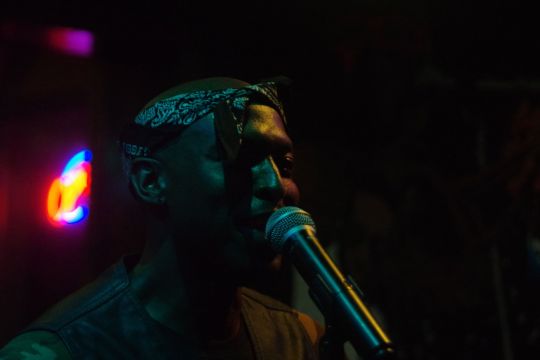
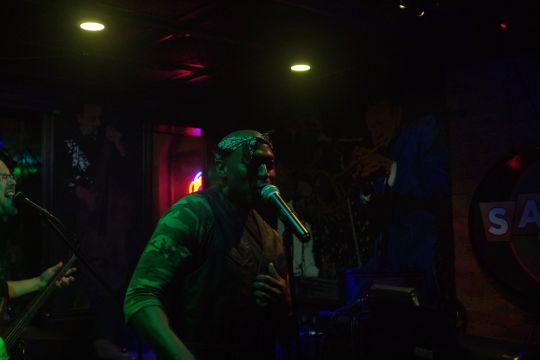

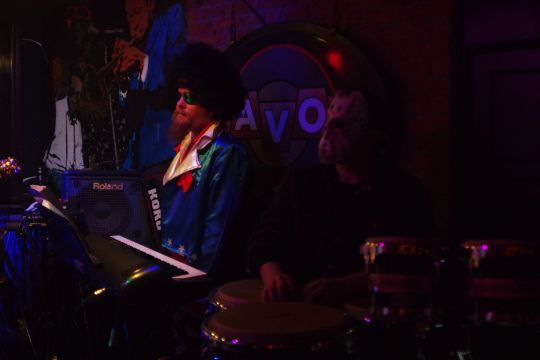
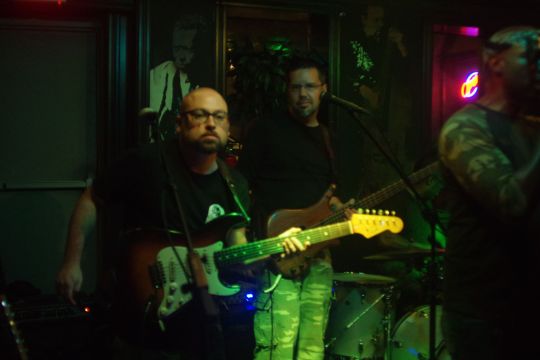
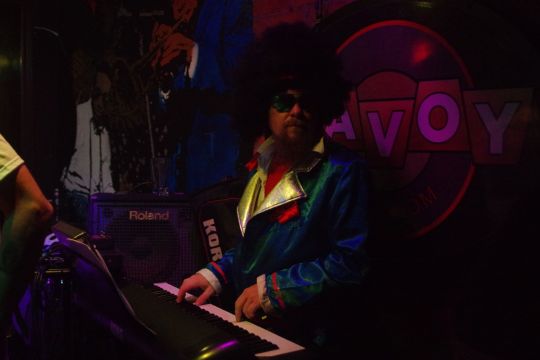
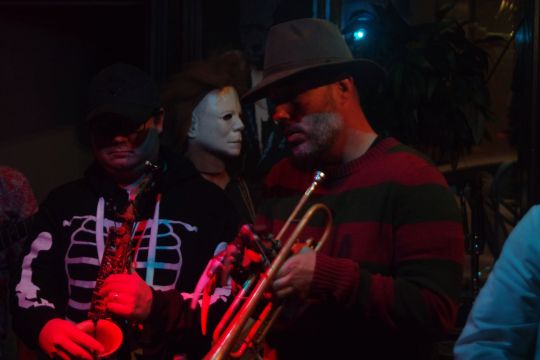
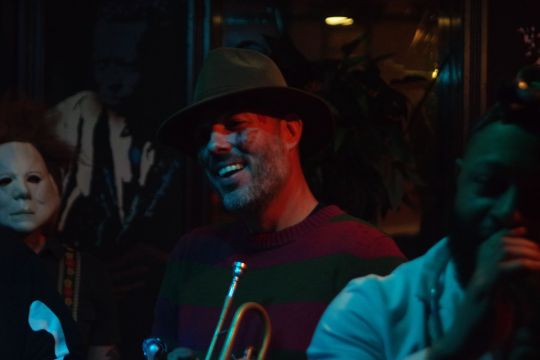
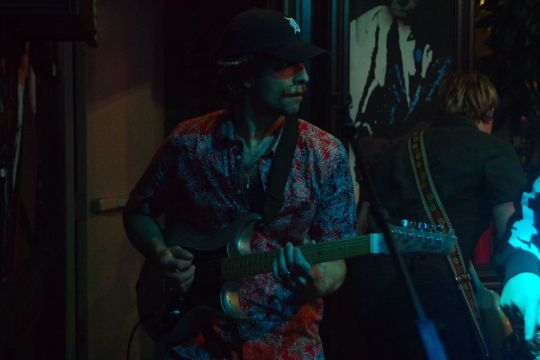
Victory Soul Orchestra and Ill funk Ensemble at Albany 2019 early edition
3 notes
·
View notes
Note
Hiii! I recently just fell in love with Queen and I think they are absolutely amazing and I love how hilarious and adorable they all are with each other. I just have one question: I can never find anything really where Brian and Deaky are being cute and talking about each other. Is there some animosity there? Just wondering. Thanks!
Oh wow this a GREAT ask. I actually feel quite honored that you came to ask me about this!
First of all, hi!! Welcome to the Royal Family!! Always great to have new Queenies on board.
So, the short answer to this is, yes. There was a bit. But allow me to elaborate.
I think from the beginning, John and Brian were never as close with each other as they were with Freddie or Roger. John was introduced to Roger and Brian at a club through a mutual friend, and John and Roger hit it off right away. They shared a lot of the same interests; cars, music, science fiction, movies. They are also the youngest, so they were immediately buddies. Once John joined Queen, Freddie felt the need to sort of be John's "band mom", for lack of a better term. John was always incredibly shy around new people and crowds, so Freddie sort of became John's voice, and tried to kind of protect him from some of the crazier aspects of the rock 'n' roll lifestyle. Now, although they got along and worked fine together professionally, and respected each other as musicians, I don't think Brian and John quite had that close of a connection.
However, when John found those old radio parts and built his home made amp in 1972, he brought it to Brian and immediately Brian started experimenting with it and various other equipment. The Deacy Amp was responsible for a lot of the layering and tone and such that became an integral part of Queen's sound. Take a listen, for example, to Brian's song "Good Company". He was able to create the illusion of a string ensemble by layering the Red Special through the Deacy Amp. There's a great article on it here. Brian still has and uses the original Deacy Amp.
As time went on, John started to become more involved in the decision making and songwriting processes. He started joining arguments. He became more confident in himself and his place in the band. With that comes more friction between these four very strong personalities. It's important to understand that the four members of Queen had vastly different songwriting styles and musical tastes. Roger is a very punk rock style drummer. Brian, for the most part, has that sound that leans from prog rock into metal, with his occasional foray into folk style. John is a funk master. He was all about funk, Motown, and disco. One of his favorite groups was Cream. Freddie loved his fantasy songs, and was very into pulling classical piano and opera sound into his songs.
The point where this all comes to a head is on their 1982 album Hot Space. You can look up critical reviews of this album, most of them will say that it was very "self indulgent" of Queen, and it strayed very far from their "usual sound" (which is saying a lot for a band whose sound had already been all over the place. For the love of cheese, their biggest album to date was called A Night At The Opera, which spanned from music hall to folk songs to seaside ditties to love ballads. I digress.) Now I've heard lots of different takes on this. Apparently the recording of Hot Space was a tense time, but it was all around a bad time in Brian's life in general, for personal and professional reasons. He and Roger were fairly opposed to the idea of a disco album. The Game had already featured a lot of funk style, and they'd broken their one rule and used synthesizers. Roger and Brian wanted to return more to their prog rock roots. Freddie and John, however, were really pushing for more exploration into these styles and genres. They wanted to move with the times. It's been said that at some point in all of this, John and Brian came to a head and had the worst fight they'd ever had. This, supposedly, was the birth of "Back Chat". I don't know that it's been confirmed, but listening to it, it's really difficult to think that Deacy wrote it about anybody but Brian and their difficulties, especially with the line, "You stand so tall, you don't frighten me at all". The song just screams frustration. It's also said that they argued about whether Brian should put a guitar solo in it (Deacy apparently didn't want one).
However, they seem to have pulled through this just fine. They went on tour shortly after the album was released, and "Staying Power", which is the first track on Hot Space, became really popular during that tour. Brian can now, it seems, look back on it with no ill will.
During recording for The Works and A Kind of Magic, and their subsequent tours, for the most part, they seemed to be back to the professional rapport they'd had before. Roger and John did a lot of the public appearances and gave interviews. Freddie, I believe, was working a lot on his solo work. Brian was dealing with the dissolution of his marriage (but that's a whole other can of worms.) But Queen as a whole was back in tip-top shape. There are even a few shared moments on stage between John and Brian. One in particular I can think of is them teaming up to harass Freddie a little at one show when he made them wait to start the next song so could get his water.
During Freddie's final years, and the making of The Miracle and Innuendo, they all seemed to really pull together after taking a small hiatus from working together. Those two albums were on a much higher level than most of the work they'd done in the 80's. They were back in the swing of things. John was even more confident snd more willing to give interviews.
Brian, as well as Freddie's long term partner Jim Hutton, said that John wasn't around all that much toward the end, as Freddie's illness was really quite difficult for him to deal with. And, supposedly, when finishing Made In Heaven, there was a bit more tension as they all argued over how to finish this album without their voice of reason. But when you've just lost your best friend to an illness that no one seems to even want to understand, you're bound to lash out even at those closest to you.
Now, Brian speaks about John with nothing but respect, appreciation and admiration. He always, I believe, had that respect and awe for Deacy as a bassist and musician. He talks often of how lyrical and melodic John was on bass, and how much of a powerhouse he and Rog were as a rhythm section. He has spoken of how John is still a part of the business side of Queen, and how he always informs John of what they are doing. He doesn't always get an answer about things, but he keeps John in the loop. And there's also a tweet floating around out there where he said that John's songs are still good!!
So in conclusion, yes, there was some tension, but not any more than there was in the rest of the band (there are some.stories there, too. They fought so hard some times they'd start throwing things), but I think the reason we don't see as much interaction between Brian and John is simply because, while they were friends and bandmates, they didn't have the same close relationship with each other as they did with Freddie or Roger, which is neither good nor bad. It just is. They still spent 20 years as half of an absolute musical power group, were able to create amazing music together and spend so much time in close quarters without killing each other or walking away from the band.
Also, have this. I think it's cute.
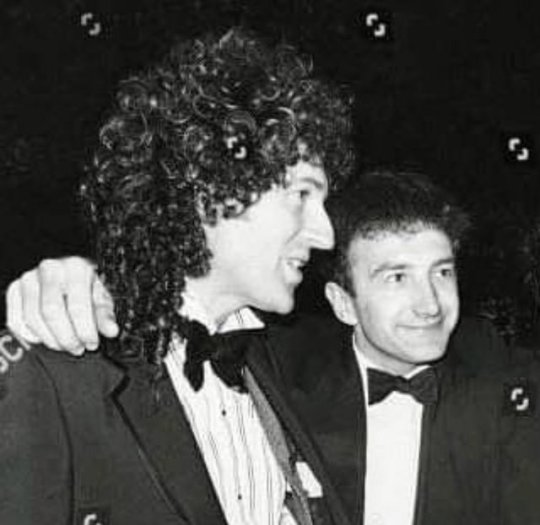
(Oh god I'm sorry this got so long. Also if anyone would like to add/correct any of this, please feel free. I am definitely NOT the last authority on this!)
153 notes
·
View notes
Text
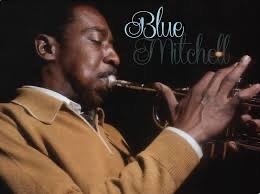
Richard Allen “Blue” Mitchell (March 13, 1930 – May 21, 1979) was a jazz, rhythm and blues, soul, rock, and funk trumpeter, and composer who recorded many albums as leader and sideman for Riverside, Blue Note, and Mainstream Records.
After high school, he played in the rhythm and blues ensembles of Paul Williams, Earl Bostic, and Chuck Willis. After returning to Miami he was noticed by Cannonball Adderley, with whom he recorded for Riverside Records in NY in 1958.
He then joined the Horace Silver Quintet, playing with tenor saxophonist Junior Cook, bassist Gene Taylor, and drummer Roy Brooks. He stayed with Silver’s group until the band’s break-up in 1964, after which he formed a group with members from the Silver quintet, substituting the young pianist Chick Corea for Silver and replacing Brooks, who had fallen ill, with drummer Al Foster. This group produced several records for Blue Note. It disbanded in 1969, and he joined and toured with Ray Charles until 1971.
He performed with John Mayall, appearing on Jazz Blues Fusion and subsequent albums. He recorded and worked as a session man in the genres noted, performed with the big band leaders Louie Bellson, Bill Holman, and Bill Berry, and was the principal soloist for Tony Bennett and Lena Horne. Other bandleaders Mitchell recorded with include Lou Donaldson, Grant Green, Philly Joe Jones, Jackie McLean, Hank Mobley, Johnny Griffin, Al Cohn, Dexter Gordon, and Jimmy Smith. #africanhistory365 #africanexcellence
0 notes
Text
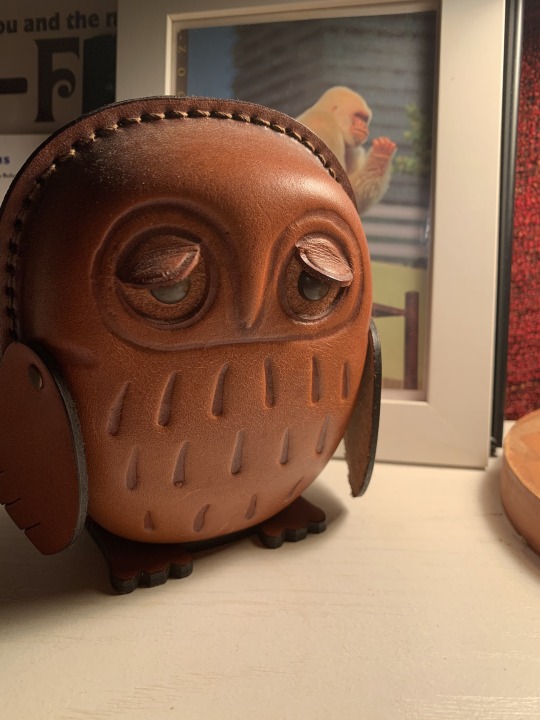
youtube
Thank you for coming to Damn Right Show Wednesday ! Wednesday is less funk and soul 45s, wide range type of music I select for you. That is Freestyle Funk Selection, I hope to enjoy. Wednesday is a little bit different. Tomorrow me become a different man, maybe play mainly 45s Funk n' Soul club of Nishinomiya flavor. Don't miss it. I'll do same time same address. See you tomorrow !
"Come Home" MAMA T (Stoic)
"Standing With You" THE RESONAIRES (Colemine)
"No Turning Back" EMMA NOBLE (Cosmos Music)
"The Ills" MAYER HAWTHORNE (Stones Throw)
"Hip Teens Don't Wear The Blue Jeans" THE FRANK POPP ENSEMBLE (Blow Up)
"Too Many Girls" THE MYSTERY LIGHTS (Wick)
"I Can Only Give You Everything" NICK WATERHOUSE (Innovate Laisure)
"Cruel Desperation" ALMAS FROBTERIZAS (Names You Can Trust)
"Latin Seed" GERARDO FRISINA (Schema)
"Blues Para T" SNOWBOY AND THE LATIN SECTION (Cubop)
"What Is Hip ?" THE JUJU ORCHESTRA feat CAROLYN LEONHEART & TERRY CALLIER (Agogo)
"The Quietening" MENANGERIE (Tru Thoughts)
"Love And Hate In A Different Time" GABRIELS (Gabliels)
"Boogie On Throuh The Night" JAMES TAYLOR QUARTET (Audio Network)
"Disco Fantasy Land" TRANSPORT (Albina Music Trust)
"Worldwide Traveller" MUSIC STAR (Jaz-Zon)
"Something For Nothing" LIGHT OF THE WORLD (Ensign)
"After The Rain" STR4TA (Brownswood)
"Magic" SEAN OLIVER (One World)
"I've Known The River (Pressure Drop River Runs Deep Mix)" COURTNEY PINE (Talkin' Loud)
"Oh I Miss Her So" HOLY HIVE (Big Crown)
"Crazy You" OSUNLADE (Ubiquity)
"One Life" THE ALBERT (Perception)
"People Of Lies" JERICHO (Royal Knight)
"Farm Song" LEON GARDNER (Igloo)
"Ca-Ba-Dab" SOUL SWINGERS (Topaz)
"Scary Woman" FANTASTIC NEGRITO (Blackball Universe)
"Tornado" GUEST VILLAINS (Tiimion)
"Undecided" THE MASTERS APPRENTICES (Astor)
"Mellow Meeting" THE SUGARMAN 3 (Daptone)
"Freedom Is Free" CHICANO BATMAN (Ato)
"Open Your Eyes" ARENITA WALKER (North Broad St)
0 notes
Link
Chapters: 2/2 Fandom: Check Please! (Webcomic) Rating: Not Rated Warnings: Major Character Death Relationships: Eric "Bitty" Bittle/Jack Zimmermann, References to Jack/OFC Characters: Jack Zimmermann, Bob Zimmermann, Eric "Bitty" Bittle, Shitty Knight, Providence Falconers (Ensemble), Samwell Men's Hockey Team Additional Tags: terminal illness, Ghosts, Angst with a Happy Ending, Kinda, Major character death - Freeform, Jack finds out he has a terminal illness and rediscovers a lot about himself, Hallucinations, Bitty might be a ghost, Jack is trying to figure that one out, frank discussions of mortality, end of life planning, I don't think this is as bad as it sounds, I really enjoyed writing it, Jack moved on but not really, Bitty really didn't move on, but he's doing alright, Supernatural Elements Summary:
Eighteen years ago, Samwell suffered the tragic loss of one of their most promising young athletes. Ever since rumors have circulated that the school is haunted by the ghost of Eric Bittle. At least, that’s the only way anyone can seem to explain why the locker rooms smell like freshly baked apple pie on game days instead of the usual, omnipresent hockey funk.
Now in the twilight of his career, Jack Zimmermann is facing his own mortality and the last item on his bucket list?
Return to Samwell and disprove the rumor that his long-dead boyfriend is haunting Faber Memorial Rink.
0 notes
Text
Celebrity Sex Scandal - The Fundamental
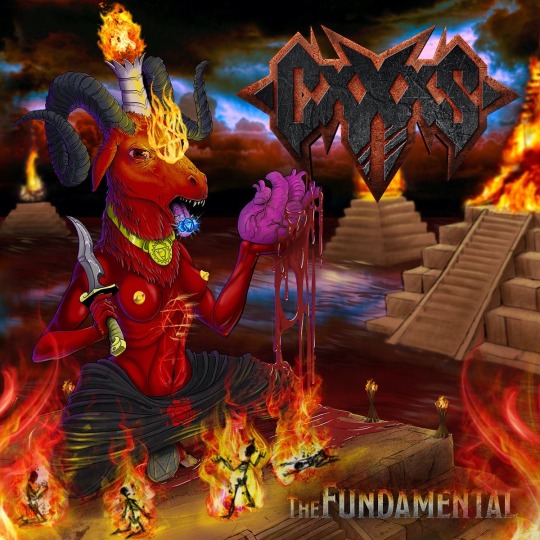
I don’t want to be too hard on this album because I genuinely don’t think it’s particularly ill-conceived or transparently lazy; it just kinda didn’t work out.
Celebrity Sex Scandal are a pretty hefty eight-member ensemble from San Antonio, Texas who got their start partially through an online crowdfunding campaign. The band dazzled eager fans with their odd, cockeyed approach to the gratuitous genre layering of progressive metal and experimental rock, and the band’s third album unfortunately just goes to show that experimental doesn’t always equate with good, of course, because not every experiment is a success. In fact it’s kind of suggestive in the name that most of it isn’t.
The thing that makes The Fundamental not such a hit as an experiment is that it’s really more messy than experimental. While it tosses together the disparate likes of funk rock, sludge metal, southern rock, and swing into a blender with a bunch of unusual instrumental components, at the core of it all and most prevalent in the mix of styles is this stale post-grunge alternative rock/metal that also dictates the direction the music goes in, which ultimately leads to the individual compositions being surprisingly predictable for an eccentric experimental album (and not in a flattering way). There are a few pretty rough performances throughout the album too.
I get that this album is obviously pretty tongue-in-cheek and that some of its forced oddity is meant to serve the purpose of parody, but it doesn’t exactly salvage the mostly unappealing compositions and performances throughout, not that there aren’t a few relative bright spots.
Overall though, I’m just not feeling the band’s superficially wacky genre-orgy style on this album. Still, I will be eager to hear whatever the band have in store for us next; hopefully this was just a hiccup in the grander scheme of things. And I hope they keep at it with their experimental ambition.
4/10
0 notes